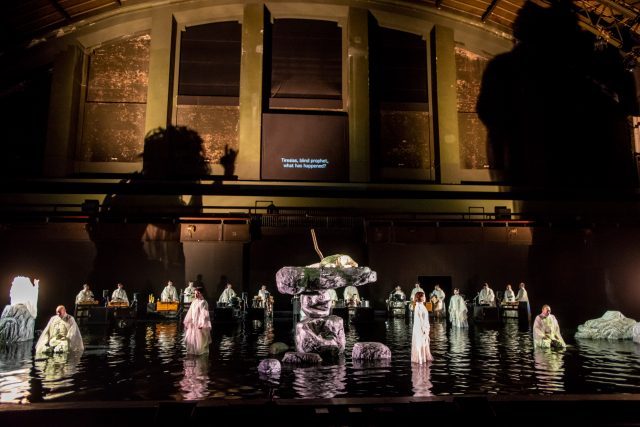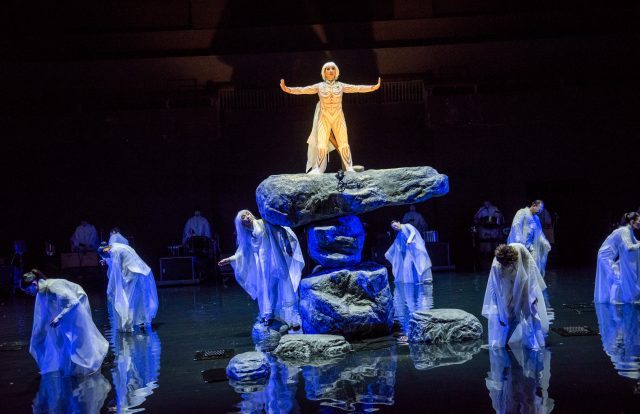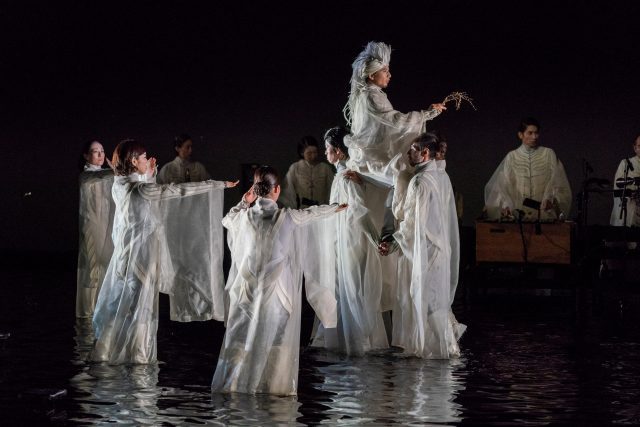
The Park Ave. Armory’s Wade Thompson Drill Hall has been transformed into the Styx-like Sanzu River for breathtaking version of Antigone (photo © Stephanie Berger)
Park Avenue Armory
Wade Thompson Drill Hall
643 Park Ave. at 67th St.
Through October 7, $35-$175
Artist talk with Satoshi Miyagi and Carol Martin, October 4, $15, 6:30
armoryonpark.org
Satoshi Miyagi’s lush Antigone at the Park Ave. Armory is likely to be the most stunning and graceful adaptation of Sophocles’s classic Greek tragedy you’ll ever experience. Originally presented in a courtyard in a fourteenth-century palace in France to open the 2017 Avignon Festival, the hundred-minute production has been adjusted for the armory’s massive Wade Thompson Drill Hall. The work uses almost exactly half the drill hall space, taking place on a long, shallow eighteen-thousand-gallon pond at the far end of the hall, with the audience sitting in rising rafters before it. Miyagi, who previously staged a different version of the twenty-five-hundred-year-old play in 2004, has now infused it with Buddhist meditations on ritual and death. As the audience is being seated, characters in white kimono-like dress are standing like ghosts in the water, surrounded by several large cairns. (The elegant set is by Junpei Kiz, the sublime costumes by Kayo Takahashi, and the fab hair and makeup by Kyoko Kajita.) The main actors come out and gleefully announce that they are a troupe from the small city of Shizuoka about to put on Antigone, identifying who they are portraying and playfully giving an English-language summary of the story. At the end of the intro, the charming Micari, who plays the title character, exclaims, “We invite you to see what happens next. Enjoy the show!”
What happens next is exquisite. Miyagi combines elements of traditional Noh, kabuki, and bunraku theater to create a brilliant retelling of the well-known tale, with the main characters each portrayed by two actors, one who speaks the dialogue (in Japanese, with English supertitles) while kneeling in the water, the other who lyrically moves about the space and interacts with the rest of the cast. The priest (Tsuyoshi Kijima) floats in on a small raft with paper lanterns; he stops to give shiny white wigs to the protagonists. The sons of Oedipus, Eteocles (Morimasa Takeishi) and Polyneices (Keita Mishima), have killed each other in battle, the former fighting for King Creon (Kouichi Ohtaka; Kazunori Abe), the latter leading a revolt. Creon has declared that Eteocles is to get a hero’s funeral while Polyneices will be treated as a traitor, his body left to rot and decay in the desert — and that anyone who attempts to give him an honorable burial will be stoned to death.

Antigone (Micari) declares her freedom from the rules of the state in lush Satoshi Miyagi production (photo © Stephanie Berger)
Oedipus’s daughters, Antigone (Micari; Maki Honda) and Ismene (Asuka Fuse; Yuumi Sakakibara), disagree on how to proceed: While Ismene does not want to challenge Creon’s decree, Antigone is determined to follow the law of the gods and do right by Polyneices. “One sought to destroy us. One fought to defend us,” Ismene says about her brothers. “The dead are all the same. We send them off with the same rites,” Antigone argues. “That will not do. The death of a hero is different than that of a traitor,” Ismene answers. Antigone: “The difference doesn’t extend past death.” Ismene: “An enemy is an enemy even after death.” Antigone: “I was not born to hate. I was born to love.” Antigone, who is betrothed to Creon’s son, Haemon (Yoneji Ouchi; Daisuke Wakana), buries Polyneices and is turned in by a guard (Katsuhiko Konagaya; Tsuyoshi Kijima) who witnessed her illegal act. Creon then has to decide the fate of his would-be daughter-in-law as both Haemon and the blind prophet Tiresias (Takahiko Watanabe; Soichiro Yoshiue) demand mercy.
Antigone features a thrilling percussion score by Hiroko Tanakawa. Koji Osako’s extraordinary lighting design puts small lights in front of the moving actors, casting huge shadows on the wall that hover over everything like the gods looking down on humanity while evoking shadow puppet theater. Translated by Shigetake Yaginuma, the narrative, which resonates with regard to current global political situations (particularly in Japan, Greece, and America), centers on themes of gender and power. “As long as I live, no woman shall impose her will,” Creon says. “Never let a woman triumph over you,” he tells his son, who is torn between his love of Antigone and his duty to his father. Early on, Ismene explains to Antigone, “I cannot act in defiance of the state.” But Antigone refuses to acknowledge the government above the gods. “I do not fear the king,” she declares. “The law of the gods is what is most precious. . . . In the eyes of the king, mine must seem the actions of a stupid woman. But in my eyes, the king is foolish.”

Haemon (Yoneji Ouchi) is torn between love for this betrothed and responsibility to his father in Antigone (photo © Stephanie Berger)
Throughout the show, the chorus (Ayako Terauchi, Fuyuko Moriyama, Haruka Miyagishima, Kenji Nagai, Mariko Suzuki, Miyuki Yamamoto, Moemi Ishii, Momoyo Tateno, Naomi Akamatsu, Ryo Yoshimi, Shunsuke Noguchi, Yu Sakurauchi, Yukio Kato, Yuya Daidomumon, Yuzu Sato) slowly wanders across the Styx-like Sanzu River, which leads the dead to the afterlife, mostly silent except for the sounds of their feet gliding on the water and occasional musical verses, including, “Wonders are many, and none is more wonderful than man. . . . Never without resources, he has devised escapes from desperate plagues. Only against Death shall he call for aid in vain.” Miyagi, who with the Shizuoka Performing Arts Center has also staged Medea, Mahabharata, and Peer Gynt among other classics, is emphasizing the notion that death is the great equalizer, that people should not be basing their earthly deeds on how it will impact what may or may not occur when the end comes. It’s not about heaven and hell or good vs. evil, the living and the dead or the rich and the poor; his Antigone is set in an ambiguous time and place that could be anywhere and everywhere, a breathtaking display of philosophy and artistry that, at its core, is about the basic decency of love, honor, and respect. Do whatever you can to see it, even if you have to defy your own personal gods of schedules and emails.